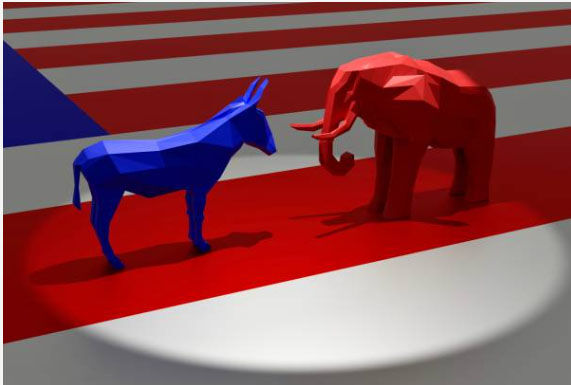‘Disney Effect’ meets reality at Colorado Supreme Court | GABEL

Rachel Gabel
The Colorado Supreme Court heard arguments elephants deserve personhood and should be released from the Cheyenne Mountain Zoo. It gave Colorado the dubious accomplishment of being the first western state high court to hear arguments nonhumans are entitled to the legal right. That’ll be a fantastic addition to the state’s resume.
I’ve written before about the nonsense many have dubbed the “Disney Effect,” or anthropomorphism. It’s something that can be easily recognized since most movies of this genre “star” animals who speak, show human emotions, and periodically feature bulls walking on their hind legs with their udders between their legs.
It’s one thing to watch Baloo the bear pilot aircraft and fight off pirates in an afterschool cartoon — yes, I’m a child of the 1980s and 1990s — but quite another not to recognize the departure from reality.
Stay up to speed: Sign up for daily opinion in your inbox Monday-Friday
Elephants, and other animals, demonstrate intelligence, sensitivity and the formation of friendships. However, one group argued before the actual state Supreme Court the elephants in the Cheyenne Mountain Zoo deserve autonomy. Stop the world, I want to get off.
The justices of the state’s highest court appeared rather skeptical Missy, Kimba, Lucky, LouLou and Jamba should be released based on a habeas corpus argument that merits autonomy. I know you’ll be floored, but the cause is being championed by animal rights activists.
Jake Davis, an attorney for the Nonhuman Rights Project decried the “immense physical and psychological harm endured” by the elephants simply because they were born with “the wrong physical Biology.”
Justices quickly interrupted and asked about the actual letter of the law. Davis, who shares a love of flowery parts of speech with another activist whose name I can’t recall, compared the elephants to other groups like those who are enslaved and women.
“Everyone you just mentioned is a human person,” said Justice Richard Gabriel. “Can you cite a single case where they’ve assigned an animal case to a non-human?”
No, he could not. He did offer a dissenting opinion offered in 2020 by Bronx Supreme Court Justice Alison Y. Tuitt after the group attempted to remove Happy the elephant from the Bronx Zoo.
“The arguments advanced by the NhRP are extremely persuasive for transferring Happy from her solitary, lonely one-acre exhibit at the Bronx Zoo, to an elephant sanctuary… (Happy) is an intelligent, autonomous being who should be treated with respect and dignity.”
Pandora’s box full of evils could barely compare to the onslaught of nonsense that would be brought to courts by people seeking personhood for animals and other nonhuman things. If I were a betting woman, I would say one of the activist groups likely already has their arguments written up to grant personhood to all livestock so they can be released.
The Cheyenne Mountain Zoo was represented by former state Attorney General John Suthers, who said if an animal rights group has concerns about Cheyenne Mountain’s treatment of the animals, they should call the U.S. Department of Agriculture, which governs animal welfare, or the local district attorney for criminal prosecution.
“They don’t do that because they know they’re not in violation,” Suthers said. “The Cheyenne Mountain Zoo has the statutory authority to hold the elephants.”
Chief Justice Monica Marquez was the only justice to even lend a shred of credibility to the argument made by Davis, saying the applicability of habeas corpus has evolved over the past centuries to different categories of individuals.
Suthers said recognizing women and slaves as humans was well within the prerogative of the courts. That doesn’t allow the writ to be applied to other species. I don’t know the intestinal fortitude Suthers had to garner to gather and cite case law to counter Davis’ argument nonhumans are humans. It’s bizarre.
The Nonhuman Rights Project is, according to the website, the only civil rights organization in the U.S. dedicated solely to securing rights to nonhuman animals. They have also filed lawsuits in California, Hawaii and Michigan and list 14 elephants and chimps as clients. In 2023, they spent just shy of $1.7 million on litigation ($1.1 million), education ($497,246) and legislation ($64,967). Their total revenue was almost $2.2 million.
Colorado, as you may recall, hosted a legislative circus in 2021 and passed a law banning traveling circuses due to animal treatment concerns. We’re now in the heat of seeing the rubber meet the road requiring all eggs sold in the state to be cage-free by 2025 as a result of another push by activists. My collection of photos of empty shelves are beginning to rival pandemic-era egg shortages. Legislating through social sympathy makes for easy marketing, but the unintended consequences are far reaching.
Rachel Gabel writes about agriculture and rural issues. She is assistant editor of The Fence Post Magazine, the region’s preeminent agriculture publication. Gabel is a daughter of the state’s oil and gas industry and a member of one of the state’s 12,000 cattle-raising families, and she has authored children’s books used in hundreds of classrooms to teach students about agriculture.











